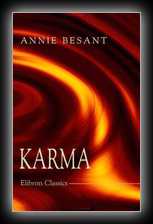
Karma
by Annie Besant
1895
EVERY thought of man upon being evolved passes into the inner world, and becomes an active entity by associating itself, coalescing we might term it, with an elemental—that is to say, with one of the semi-intelligent forces of the kingdoms. It survives as an active intelligence—a creature of the mind's begetting—for a longer or shorter period proportionate with the original intensity of the cerebral action which generated it. Thus a good thought is perpetuated as an active, benefi¬cent power, an evil one as a maleficent demon. And so man is continually peopling his current in space with a world of his own, crowded with the offspring of his fancies, desires, impulses and passions; a current which reacts upon any sensitive or nervous organization which comes in contact with it, in proportion to its dynamic intensity. The Buddhist calls it his "Skandha"; the Hindu gives it the name of " Karma". The Adept evolves these shapes consciously; other men throw them off unconsciously.
No more graphic picture of the essential nature of karma has ever been given than in these words, taken from one of the early letters of Master K. H. If these are clearly understood, with all their implications, the perplexities which surround the subject will for the most part disappear, and the main principle underly¬ing karmic action will be grasped. They will therefore be taken as indicating the best line of study, and we shall begin by considering the creative powers of man. All we need as preface is a clear conception of the invariability of law, and of the great planes in Nature.
